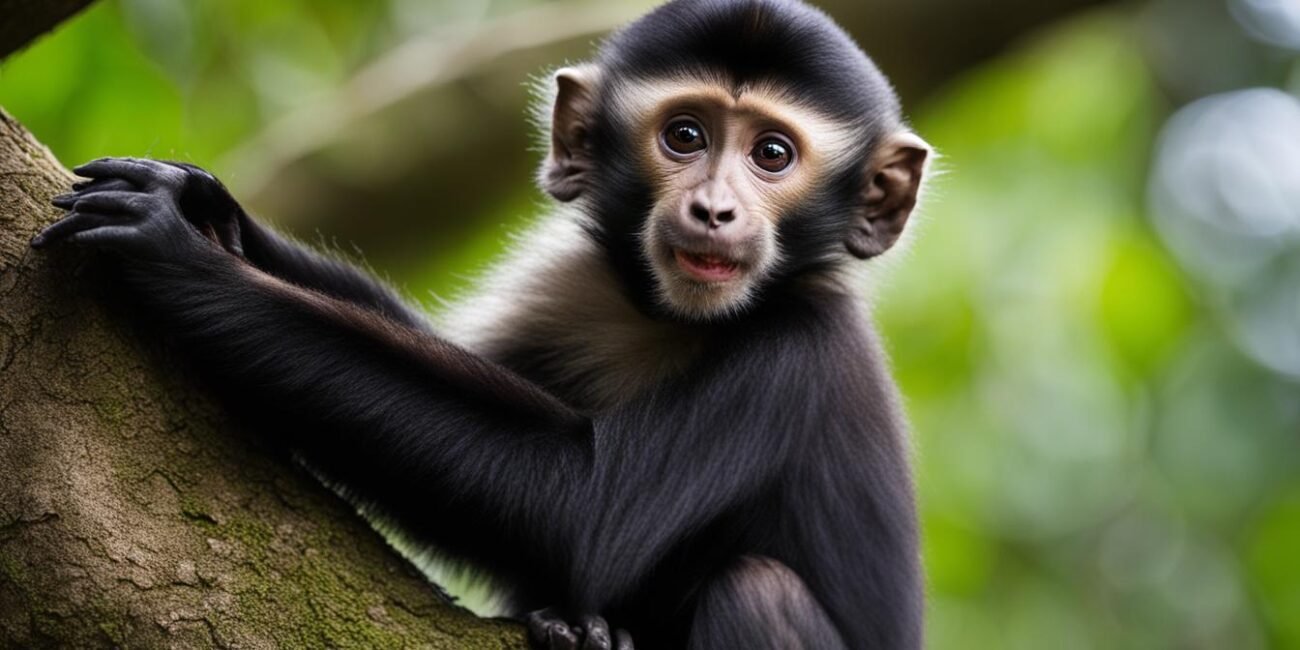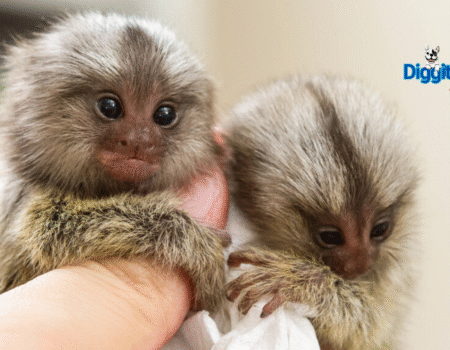Welcome to our guide on pet monkey breeds! If you’re considering adding a monkey to your family, it’s important to learn about the different breeds available. While there are over 350 species of primates, only a handful are suitable as pets. In this article, we will explore some of the most popular and exotic pet monkey breeds that you can consider.
When it comes to pet monkey breeds, there are several options to choose from. Some of the top choices include capuchins, chimpanzees, macaques, tamarins, squirrel monkeys, marmosets, and guenons. Each breed has its own unique characteristics, care requirements, and considerations.
Whether you’re looking for an intelligent and mischievous companion like a capuchin, or a vibrant and social guenon, there’s a pet monkey breed out there for you. However, it’s crucial to keep in mind that owning a pet monkey comes with its challenges and responsibilities.
In the following sections, we will delve deeper into the different breeds, discussing their needs, characteristics, and suitability as pets. We will also explore the legal and financial considerations associated with owning a pet monkey. By the end of this guide, you’ll be well-equipped to choose the best pet monkey breed that fits your lifestyle and home.
Considerations for Owning a Pet Monkey
Bringing a pet monkey into your home can be an exciting prospect. However, it is important to carefully consider a few key factors before making this decision. Owning a pet monkey comes with unique challenges and responsibilities that require careful thought and planning. In this section, we will explore the legal and financial considerations that should be taken into account.
Legal Considerations for Pet Monkeys
It’s crucial to understand that owning a pet monkey may not be legal in every area. Some states or jurisdictions have specific laws and regulations regarding the ownership of primates. These laws are in place to protect the welfare of both the animals and the public. Violating these laws can result in penalties, fines, and even the confiscation of the monkey.
Therefore, before bringing a pet monkey into your home, it is essential to research and understand the legal requirements in your area.
Financial Considerations for Pet Monkeys
Owning a pet monkey can be financially demanding. The costs associated with a pet monkey go beyond the initial purchase price. Consider the following financial aspects:
- Cost of purchase: Pet monkeys can be quite expensive to buy, with prices ranging from several thousand dollars up to tens of thousands of dollars, depending on the breed and age.
- Enclosure and supplies: Monkeys require a spacious and secure enclosure that is specifically designed to meet their needs. This includes specialized climbing structures, hammocks, feeding stations, and toys.
- Veterinary care: Monkeys have unique health needs and may require specialized veterinary care. Routine check-ups, vaccinations, and potential medical emergencies should be factored into the financial plan.
- Diet and nutrition: A proper diet is crucial for the well-being of a pet monkey. This may include a variety of fresh fruits, vegetables, proteins, and supplements.
- Long-term care: Monkeys can live for several decades, requiring ongoing care and financial commitment throughout their lifespan.
Ultimately, owning a pet monkey requires a significant financial investment, and potential owners should be prepared to meet these expenses.
Important Quote:
“Owning a pet monkey is not just a financial commitment, but also an ethical one. It is our responsibility to ensure their wellbeing and provide them with a life that meets their natural needs.”
To gain a better understanding of the financial commitment involved in owning a pet monkey, let’s take a look at a sample comparison table:
| Expense | Average Cost |
|---|---|
| Purchase Price | $10,000 – $50,000+ |
| Enclosure and Supplies | $5,000 – $10,000 |
| Veterinary Care | $500 – $2,000 per year |
| Diet and Nutrition | $1,000 – $3,000 per year |
| Long-Term Care | Varies depending on lifespan (up to 40+ years) |
While this table provides a general overview of potential costs, it’s important to remember that each pet monkey’s requirements may vary.
With these considerations in mind, it is crucial to assess whether you are prepared to meet the legal and financial responsibilities that come with owning a pet monkey. Taking the time to thoroughly research and plan ahead will ensure that both you and your new furry friend have the best possible experience.
Capuchin Monkeys: Popular and Mischievous Pets
Capuchin monkeys are highly sought-after as pets due to their popularity and mischievous nature. These intelligent creatures have captured the hearts of many, and can often be seen showcasing their impressive skills in movies and television shows. However, it is essential to understand the unique challenges associated with caring for capuchin monkeys as pets.
Capuchins are known for their high level of intelligence, which can make them both fascinating and demanding companions. They are curious and resourceful, constantly seeking mental and physical stimulation. This means that providing ample enrichment activities and opportunities for engagement is crucial for their overall well-being.
As highly social animals, capuchins have strong territorial instincts. They require a significant amount of attention and interaction with their human caregivers to ensure they feel secure and content. Regular playtime and bonding activities help to establish a strong bond and prevent behavioral issues that may arise from boredom or loneliness.
It is important to note that capuchins do not typically learn how to use the toilet and will require the use of diapers throughout their lifespan. Proper hygiene practices and cleaning routines are necessary to ensure a clean and healthy environment for both the monkey and their human companions.
“Capuchin monkeys are highly intelligent and mischievous pets that require a lot of attention and care.”
| Pros of Capuchin Monkeys as Pets | Cons of Capuchin Monkeys as Pets |
|---|---|
| 1. Intelligent and entertaining companions | 1. Requires a significant amount of attention and interaction |
| 2. Potential for bonding and building a strong relationship | 2. Strong territorial instincts and may become aggressive |
| 3. Active and playful nature | 3. Dependence on the use of diapers |
| 4. Enjoy performing tricks and learning new tasks | 4. Significant commitment of time and resources |
While capuchin monkeys can bring joy and companionship to those who are well-equipped to care for them, it is essential to consider the commitment and responsibility involved. Proper research, education, and consultation with primate experts or experienced capuchin owners can help potential pet owners make an informed decision about whether a capuchin monkey is the right fit for their lifestyle and capabilities.
Chimpanzees: Not Recommended as Pets
Although chimpanzees have been kept as pets in some cases, it is not recommended to own them as pets. Chimpanzees are large and powerful animals that can pose a significant risk to humans. They possess strength and agility far beyond that of the average person and can cause severe harm or even death. The potential dangers associated with owning a chimpanzee make them unsuitable as domestic pets.
Chimpanzees are considered exotic pet monkey breeds due to their close relation to humans and high intelligence. However, their complex physical and emotional needs cannot be adequately met in a domestic setting.
Chimpanzees are also long-lived animals, with a lifespan of up to 60 years in captivity. Caring for a chimpanzee requires a lifetime commitment, both emotionally and financially. They require specialized diets, extensive enrichment, and a significant amount of space to meet their physical and social needs.
Additionally, chimpanzees require constant supervision and may need to wear diapers when outside of their enclosure. Their strength and natural behaviors can result in property damage or potentially dangerous situations.
“Chimpanzees are complex beings with intricate social structures and unique emotional needs. Keeping them as pets can lead to severe physical and psychological harm, both for the animals and the humans involved.”
Given the risks and challenges associated with owning a chimpanzee, it is crucial to prioritize their well-being and conservation in their natural habitats rather than attempting to keep them as pets.
Comparative Analysis: Chimpanzees vs. Other Pet Monkey Species
| Aspect | Chimpanzees | Capuchin Monkeys | Macaques |
|---|---|---|---|
| Strength and Size | Highly muscular and powerful; can cause severe harm | Smaller and less strong | Vary in size; smaller than chimpanzees |
| Lifespan | Up to 60 years | Average of 40 years | Average of 25 years |
| Social Structure | Complex hierarchies and group dynamics | Less complex social structure | Varies among species |
| Suitability as a Pet | Not recommended due to their physical strength and complex needs | Popular choice but still requires significant care and attention | Some species can be suitable for experienced primate owners |
Comparing the traits of chimpanzees with other pet monkey species highlights the unique characteristics and challenges associated with owning a chimpanzee. While capuchin monkeys and macaques can also present their own set of requirements and considerations, they generally pose lower risks and may be more manageable as pets compared to chimpanzees.
Macaques and Tamarins: Small Monkey Breeds
When it comes to pet monkey breeds, macaques and tamarins are among the smaller options that some people choose to bring into their homes. Let’s take a closer look at these fascinating small monkey breeds.
Macaques: Native to Asia and North Africa
Macaques are native to Asia and North Africa and are known for their intelligence and playful nature. These small-sized monkeys can weigh up to 40 pounds, making them considerably larger than some other small pet monkey breeds. To accommodate their energy and active lifestyle, macaques require spacious enclosures where they can climb, swing, and explore.
One significant consideration when owning a macaque is their diet. These omnivorous monkeys thrive on a balanced diet consisting of fruits, seeds, nuts, vegetables, and even insects. Providing a varied and nutritious diet is crucial to their overall health and well-being.
Tamarins: Tiny New World Monkeys
Tamarins are incredibly small New World monkeys, weighing less than a pound. Despite their petite size, they have unique housing and diet requirements that must be met to ensure their health and happiness as pets. Due to their delicate nature, experienced primate owners are better suited to providing the specific care needed by tamarins.
These tiny monkeys have high energy levels and require mental stimulation. Providing them with an enriched environment that includes plenty of branches, toys, and climbing structures is essential. In terms of diet, tamarins have specialized dietary needs and mostly consume fruits, flowers, insects, tree sap, and nectar.
“Macaques and tamarins are smaller monkey breeds that can make fascinating and rewarding pets. However, it is crucial to consider their specific needs, such as adequate space, appropriate diets, and the experience required to care for these unique creatures.”
| Monkey Breed | Origin | Weight | Housing Requirements | Diet |
|---|---|---|---|---|
| Macaques | Asia and North Africa | Up to 40 pounds | Spacious enclosures for climbing and movement | Fruits, seeds, nuts, vegetables, and insects |
| Tamarins | New World | Less than a pound | Enriched environment with climbing structures | Fruits, flowers, insects, tree sap, and nectar |
Squirrel Monkeys and Marmosets: Active and Playful Pets
Squirrel monkeys and marmosets are two fascinating monkey breeds that make energetic and entertaining pets. These small primates are known for their acrobatic abilities and playful personalities, bringing joy and laughter to their owners.
Squirrel Monkeys: If you are looking for a lively and agile pet monkey, squirrel monkeys are an excellent choice. They are natural acrobats, leaping from branch to branch and exhibiting incredible agility. These monkeys require a spacious enclosure with plenty of hanging branches and ropes for them to swing and play. Squirrel monkeys are highly sociable and thrive in groups, making them ideal for households with multiple monkeys. However, it is crucial to spend quality time with them and provide mental stimulation to ensure their well-being.
Marmosets: Marmosets, on the other hand, are small squirrel-like monkeys native to South America. These pint-sized primates have unique dietary needs, requiring a specialized diet that consists of fruits, insects, and other protein-rich foods. Marmosets are best suited for experienced primate owners, as they are generally not well-suited to handling. They are highly active and prefer to be in constant motion, using their long tails to assist with balance as they explore their surroundings.
Both squirrel monkeys and marmosets require specialized care and attention. It is essential to provide them with a suitable environment that mimics their natural habitat, along with a balanced diet and mental stimulation to keep them happy and healthy.
Guenons: Vibrant Monkey Species
Guenons are a diverse group of monkey species that are native to Africa. They are known for their vibrant colors and unique facial patterns, making them visually striking creatures. There are nearly two dozen different species of guenons, each with its own distinct characteristics.
The green monkey, vervet, and grivet are among the most popular guenon species kept as pets. These monkeys have captivated many individuals with their beauty and charming personalities.
Guenons have specific requirements when it comes to their living space and social interaction. They thrive in large groups, so it is essential to provide them with ample room to move and play. Additionally, guenons are highly social animals and require regular interaction and mental stimulation to stay happy and healthy.
Owning a guenon as a pet is a significant commitment that requires a deep understanding of their unique needs. It is essential to consult with experts or experienced guenon owners before making the decision to bring one into your home.
“When guenons are raised in captivity, they exhibit incredible adaptability and can form strong bonds with their human caregivers. However, it is crucial to remember that they are still wild animals at heart and require specialized care to thrive in a domestic environment,” says Dr. Jane Collins, a primate behavior specialist.
Despite the challenges, guenons offer a delightful and fascinating experience for those dedicated to meeting their needs and providing them with a stimulating and nurturing environment.
Choosing the Right Pet Monkey Breed for You
When considering a pet monkey, it is essential to choose the breed that best suits your lifestyle, capabilities, and available resources. Each monkey breed has different care requirements, from enclosure size to diet and social interaction. It is recommended to research and consult with primate experts or owners to ensure you can provide the necessary care and attention for the chosen pet monkey breed.
Conclusion
Owning a pet monkey can be a rewarding experience, but it also comes with unique challenges and responsibilities. It is important to recognize that primates have specific needs and require proper care and attention. Before bringing a pet monkey into your home, thorough research is essential.
Understanding the legal considerations and financial implications of owning a pet monkey is crucial. Some states or jurisdictions may prohibit owning certain primate species, and obtaining the necessary permits can be complex. Additionally, the cost of purchasing and maintaining a pet monkey can be significant.
In addition to legal and financial aspects, providing a suitable environment and lifestyle is vital for pet monkey ownership. Primates require ample space, mental stimulation, social interaction, and a balanced diet. It is crucial to ensure that you can meet these requirements to ensure the well-being of your pet monkey.
Ultimately, owning a pet monkey can be a wonderful experience for those who are well-prepared and committed. It is a responsibility that should not be taken lightly. By considering the challenges and responsibilities that come with pet monkey ownership, you can make an informed decision and provide a loving and fulfilling life for your new furry friend.
FAQ
What are some popular pet monkey breeds?
Some popular pet monkey breeds include capuchins, chimpanzees, macaques, tamarins, squirrel monkeys, marmosets, and guenons.
Are pet monkeys suitable for everyone?
Primates have unique needs and require a significant amount of time, attention, and space, making them unsuitable for everyone.
Can I legally own a pet monkey?
Owning a pet monkey may be illegal in certain states or jurisdictions, and acquiring the necessary permits can be a complex process.
How much does it cost to own a pet monkey?
Owning a pet monkey can be expensive, both in terms of purchase price and ongoing maintenance costs throughout their lifetime.
Why are capuchin monkeys popular as pets?
Capuchin monkeys are popular as pets due to their high intelligence, mischievous nature, and ability to perform tricks.
Are chimpanzees recommended as pets?
Chimpanzees are not recommended as pets due to their large size, strength, and potential danger they pose to humans.
What are some small monkey breeds kept as pets?
Some small monkey breeds kept as pets are macaques and tamarins, which have specific care requirements.
What are the care needs of squirrel monkeys and marmosets as pets?
Squirrel monkeys and marmosets as pets require specialized care, including specific housing, diet, and ample space for their acrobatic activities.
What is unique about guenons as pet monkey species?
Guenons are known for their vibrant colors and diverse facial patterns and thrive in large social groups, requiring a specific living environment and social interaction.
How can I choose the right pet monkey breed for me?
When choosing a pet monkey breed, consider your lifestyle, capabilities, available resources, and the specific care requirements of each breed.
What are the challenges of owning a pet monkey?
Owning a pet monkey comes with challenges such as meeting their unique needs, legal considerations, and the commitment required in terms of time, attention, and financial resources.










No Comment! Be the first one.